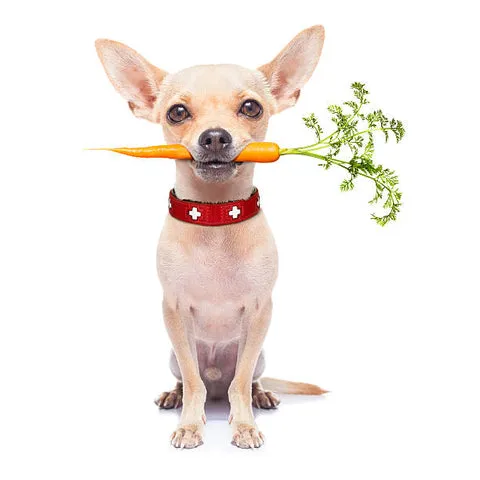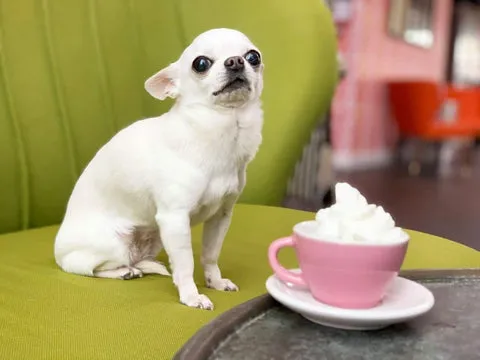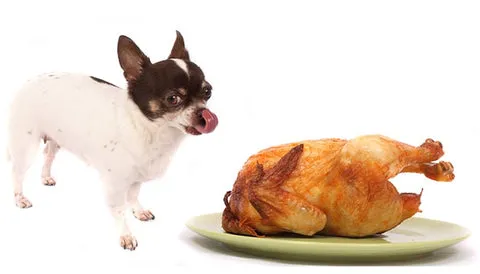As a loving Chihuahua parent, it’s incredibly tempting to share bites of your delicious meals with your tiny companion. Their expressive puppy eyes can be hard to resist! However, it’s crucial to understand that many human foods are not only unsuitable but can be extremely dangerous, even fatal, for your Chihuahua. Their small size makes them particularly vulnerable to substances that might only cause mild discomfort in larger breeds. Knowing what foods can’t dogs eat list is vital for their health and well-being. This guide will help you navigate the culinary landscape for your little one, detailing the foods to strictly avoid, those to offer in moderation, and the safe human treats your Chihuahua can enjoy without worry.
Before diving into specific items, two ubiquitous ingredients demand immediate attention due to their prevalent use in human cooking: salt and fat. Excessive salt intake can lead to dehydration and, in severe cases, salt poisoning, manifesting as vomiting, diarrhea, and seizures. Too much fat, even from “good” sources, can overwhelm your Chihuahua’s delicate system, potentially causing liver damage or pancreatitis. Always be mindful of these when considering sharing any human food.
Chihuahua Foods to Avoid at All Costs
This section details a critical list of items that should never be fed to your Chihuahua due to their high toxicity. Keep these far out of reach to ensure your pet’s safety.
Alcohol
It may seem obvious, but alcohol is incredibly toxic to dogs, especially small breeds like Chihuahuas. Even a minuscule amount can lead to ethanol poisoning. Beyond alcoholic beverages, be aware that fermented fruits, yeast dough, and even some household products like sugarless gum, mouthwash, and hand sanitizer can induce alcohol-like symptoms. These include vomiting, dehydration, weakness, a wobbly gait, panting, lethargy, hypoglycemia, abdominal pain, and potentially seizures, coma, or even death.
Caffeine and Tea
Your morning ritual with a warm cup of coffee and your Chihuahua cuddling on your lap is a lovely image, but never let them consume your drink. Caffeine is a powerful stimulant that can severely affect your Chihuahua’s nervous system, causing an increased heart rate, vomiting, seizures, tremors, and in extreme cases, death. This applies to coffee, tea (even decaffeinated, as it still contains traces), soft drinks, energy drinks, and chocolate, all of which contain varying levels of caffeine or similar compounds.
Chocolate
While many dogs are drawn to sweets, chocolate is absolutely off-limits for Chihuahuas. The dangerous component in chocolate is the chemical theobromine. Unlike humans, Chihuahuas metabolize theobromine very slowly, allowing it to build up to toxic levels in their system. The darker the chocolate, the higher the concentration of theobromine. If you suspect your Chihuahua has ingested chocolate, contact your veterinarian immediately. Prompt action is crucial, as symptoms can appear hours later, making interventions like induced vomiting less effective.
Xylitol
Xylitol is an artificial sweetener commonly found in sugar-free products like gum, candies, certain peanut butters, and some baked goods. It’s also present in some non-sugar-free items. Xylitol is profoundly toxic to dogs, causing a rapid release of insulin that leads to a dangerous drop in blood sugar (hypoglycemia) and potential liver failure. Always check product labels for xylitol before sharing any human food or allowing access to certain household items.
Bones
While the image of a dog with a bone is iconic, certain bones, especially cooked chicken and fish bones, are highly dangerous for Chihuahuas. These bones can splinter easily, posing a significant risk of choking, internal punctures to the esophagus, stomach, or intestines, and blockages in the digestive tract. Even raw bones can present hazards. It’s always safer to opt for veterinarian-approved chew toys or dental treats designed specifically for small dogs.
 Chihuahua wearing a small dog coat, looking up intentlyA small Chihuahua looking up with attentive eyes while sitting on a blanket.
Chihuahua wearing a small dog coat, looking up intentlyA small Chihuahua looking up with attentive eyes while sitting on a blanket.
Garlic and Onions
Garlic and onions, along with leeks and chives, are part of the Allium family and are extremely toxic to Chihuahuas. They contain N-propyl disulfide, a compound that damages red blood cells, leading to a type of anemia that can make your Chihuahua lethargic and weak, and in severe cases, cause collapse. Even small amounts of garlic can make your dog sick. Be vigilant, as these ingredients are common in many processed human foods.
Unbaked Dough
Raw yeast dough is a double threat. When ingested, it can expand in your Chihuahua’s warm stomach, leading to painful bloating and potential gastric dilatation-volvulus (GDV), a life-threatening condition. Additionally, the yeast ferments, producing alcohol that can lead to ethanol poisoning, as discussed earlier. Always keep raw dough out of your Chihuahua’s reach.
Avocado
Avocado contains persin, a fungicidal toxin. While generally considered to cause mild stomach upset in dogs, it’s particularly concentrated in the pit, skin, and leaves. In Chihuahuas, due to their small size, even a small amount could cause gastrointestinal distress like vomiting and diarrhea. It’s best to keep all parts of avocado, including guacamole, away from your tiny friend.
Lemons and Limes
Citrus fruits like lemons and limes contain psoralen, which can be toxic to Chihuahuas if consumed in significant amounts. Symptoms of psoralen poisoning can include dizziness, walking difficulties, gastrointestinal upset, and in severe cases, liver damage or death. It’s best to avoid all citrus fruits for your Chihuahua.
Macadamia Nuts
While some nuts are safe in strict moderation, macadamia nuts are a definite exception and are highly toxic to Chihuahuas. They contain an unknown toxin that can cause vomiting, weakness, tremors, and hyperthermia. Other nuts, while not toxic, are often high in fat and calories, which can lead to digestive upset or pancreatitis if consumed in excess. For more information on safe and unsafe meats, you might want to read about what meat should all dogs avoid.
Grapes and Raisins
Grapes and raisins are notoriously toxic to dogs, including Chihuahuas. Even a small amount can lead to acute kidney failure, a life-threatening condition. The exact toxic substance is still unknown, but the severity of the reaction means these fruits should never be given to your dog.
Nutmeg
Nutmeg contains myristicin, an ingredient that can cause serious health issues if ingested in large amounts by dogs. Symptoms can include confusion, dry mouth, stomach pain, increased heart rate, high blood pressure, and even seizures. Many baked goods contain nutmeg, so be cautious with human treats.
Human Foods Chihuahuas Can Eat in Limited Amounts
Some human foods aren’t outright toxic but should only be offered occasionally and in very small quantities due to potential digestive upset or high calorie content.
Dairy
Many Chihuahuas are lactose intolerant, meaning dairy products can cause digestive issues like diarrhea and gas. A tiny bit of plain, low-fat milk or yogurt occasionally might be fine, but daily consumption is not recommended. Always observe your dog for any adverse reactions. If you’re wondering what does cheese do to a dog, it’s similar – small, plain, low-fat pieces are generally okay in moderation, but too much can lead to digestive upset.
Tomatoes
Ripe red tomatoes are generally safe for Chihuahuas in moderation. However, green tomatoes and the leafy green parts of the plant contain solanine, a toxic chemical. Solanine poisoning can cause dizziness, weakness, and an increased heart rate. Always ensure any tomato offered is fully ripe and free of stems and leaves.
Cashews
Cashews, like other nuts (excluding macadamia), are not toxic but are high in fat and calories. If you choose to offer them, ensure they are unsalted and plain, and only give one or two as a rare treat to avoid digestive upset or weight gain.
Cinnamon
Cinnamon itself is not toxic to Chihuahuas. However, consuming it, especially in powdered form, can cause irritation to their digestive system. Breathing in cinnamon powder can also lead to coughing, choking, and breathing difficulties. It’s best to keep your Chihuahua away from cinnamon.
 A small Chihuahua resting on a textured blanket, looking contemplative.A contemplative Chihuahua resting on a soft blanket.
A small Chihuahua resting on a textured blanket, looking contemplative.A contemplative Chihuahua resting on a soft blanket.
Honey
While not toxic, honey is high in sugar. Frequent or excessive consumption can contribute to weight gain and dental problems, and potentially lead to obesity. Offer only a very tiny lick as an infrequent treat.
Cherries
Fresh cherries, with the pits removed, can be given in very small, limited amounts. The pits contain cyanide, which is poisonous, and they also pose a choking hazard for Chihuahuas. Due to their sugar content and potential for causing diarrhea if overconsumed, one or two de-pitted cherries occasionally is the maximum. If you’re curious about what fruits not to give dogs, it’s a good idea to research carefully.
Safe Human Foods Chihuahuas Can Enjoy
Fear not, there are many human foods that can be healthy and delicious additions to your Chihuahua’s diet, provided they are prepared correctly and offered in appropriate portions. Always ensure they are unseasoned and cooked plain.
Meat
Cooked, unseasoned lean meats like chicken, fish (boneless), beef, and pork are excellent sources of protein for your Chihuahua. Always remove all bones, especially from chicken and fish, as they can splinter and cause injury. Avoid any meat seasoned with salt, garlic, or onions.
Shrimp
Cooked, de-shelled, and unseasoned shrimp can be a fantastic treat, providing protein and other nutrients. Ensure they are thoroughly cooked to eliminate any pathogens.
Rice
Plain, cooked white or brown rice is often recommended for dogs with sensitive stomachs and can be a good source of carbohydrates. Make sure it’s unseasoned, without salt or butter.
Eggs
Cooked eggs (scrambled, boiled, or fried without oil) are a great source of protein and essential nutrients. Never feed raw eggs due to the risk of salmonella.
Oatmeal
Plain, cooked oatmeal made with water (not milk) and without added sugar or flavorings can be a healthy fiber source.
Other Safe Options:
- Potatoes: Cooked plain, without seasonings.
- Sweet Potatoes: Cooked plain, an excellent source of vitamins.
- Corn: Off the cob, as the cob poses a choking hazard.
- Pumpkin: Cooked and pureed (without spices), excellent for digestive health. Remove seeds.
- Peanut Butter: Only natural, unsalted, unsweetened peanut butter, free of xylitol.
- Bananas: In moderation due to sugar content.
- Oranges: Small amounts, peeled and deseeded, in moderation.
- Mango: Peeled, pitted, and in small amounts.
- Celery: A crunchy treat, good source of vitamins and minerals.
- Strawberries: In moderation.
- Coconut: Fresh coconut meat (without husk), in moderation.
- Apples: Sliced, peeled, and deseeded.
- Blackberries: In moderation.
- Watermelon: Deseeded and without rind.
- Pineapple: Peeled, cored, and in small amounts.
- Blueberries: A fantastic antioxidant-rich treat.
- Carrots: Raw or cooked, excellent for dental health.
- Broccoli: Small, cooked florets in moderation.
- Green Peas: Cooked or raw.
- Bread: Plain, white or whole wheat bread in very small amounts.
- Mushrooms: Only plain, store-bought white or crimini mushrooms. Avoid wild mushrooms.
- Popcorn: Plain, air-popped, and without salt or butter.
These foods, when properly prepared, can serve as healthy treats or supplements to your Chihuahua’s regular dog food. You can learn more about what to give my dog to eat for a balanced approach.
 A small Chihuahua looking directly at the camera with curiosity.A curious Chihuahua puppy with big eyes looking intently forward.
A small Chihuahua looking directly at the camera with curiosity.A curious Chihuahua puppy with big eyes looking intently forward.
At the End of the Day…
It is paramount to understand that while certain foods offer benefits to humans, they can be toxic, poisonous, or even deadly to Chihuahuas. Even with the comprehensive lists of foods to avoid, limit, and allow, vigilance remains key when feeding any human food to your tiny companion. Every dog is unique, and what might be perfectly fine for one Chihuahua could cause an adverse reaction in another.
Always monitor your Chihuahua closely after introducing any new human food. Combine these treats with their regular, high-quality dog food, and everything should be just fine. For ongoing support and to connect with other Chihuahua enthusiasts, consider joining our private Chihuahua We Love Facebook group! Your Chihuahua’s health and happiness are in your hands.
